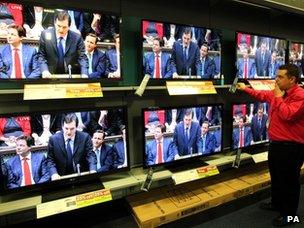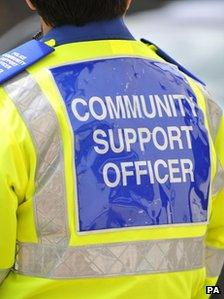Do bobbies on the beat really cut crime?
- Published
- comments

Burglary rates may also have fallen as the value of second-hand goods dropped
Interesting to read that former home secretary David Blunkett believes the police shift from the reactive "Z-Cars era of flying squads" to preventative neighbourhood policing has been responsible for the "dramatic drop in crime" since the mid-1990s.
Quite why crime rose inexorably from World War II until 1995 and then started falling is a question that still puzzles criminologists.
Because crime didn't just fall in the UK. It fell in almost every developed Western nation from pretty much the same time.
It fell in Canada and in the United States - even though those two countries operate very different criminal justice policies. It fell in Scandinavia and fell along the shores of the Mediterranean. It fell in Australia and fell in Iceland.
It would be ridiculous to suggest the police have no impact, but how much does the activity of the local constabulary influence crime rates?
Evidence that police have more than a marginal impact on offending is hard to come by. It would appear that bigger forces are at play: economic, demographic, social, cultural and technological.
The reason volume car crime fell so dramatically from the mid-90s is probably much more to do with improved vehicle security than the reintroduction of bobbies on the beat.
Falling domestic burglary rates may also have been affected by the installation of locks and alarms but, equally, may have dropped along with the value of a second-hand TV or DVD player.

A PCSO on the beat
Home Office research in the mid-80s concluded: "A patrolling police officer could expect to pass within 100 yards of a burglary taking place roughly once every eight years. Even then they may not even realise that the crime is taking place."
The latest thinking is that so-called intelligent policing can help to bring down the numbers of certain offences. Targeting crime hot-spots or known offenders does seem to get results without necessarily moving the criminality elsewhere.
But the claim that neighbourhood policing is a significant factor in preventing crime remains unproven. The bobby (or PCSO) on the beat may provide a comforting uniformed presence that makes the law-abiding feel safer. They may bolster community confidence which may, in turn, encourage people to obey the law.
There is, however, little hard evidence that the renaissance of the neighbourhood bobby explains the dramatic falls in total crime we have seen since the mid-90s.